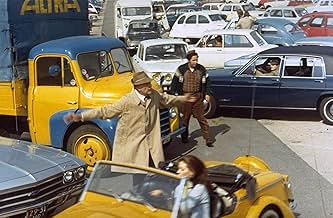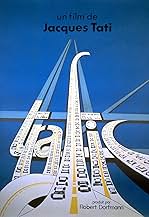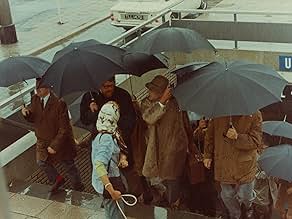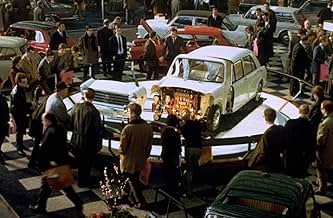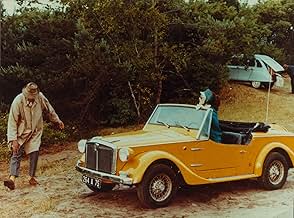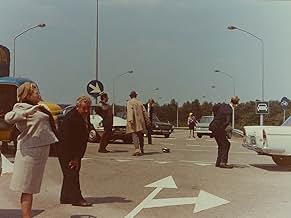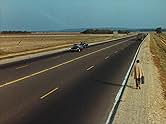IMDb RATING
7.0/10
8.1K
YOUR RATING
Mr. Hulot drives a recreational vehicle from Paris to Amsterdam in his usual comical, disastrous style.Mr. Hulot drives a recreational vehicle from Paris to Amsterdam in his usual comical, disastrous style.Mr. Hulot drives a recreational vehicle from Paris to Amsterdam in his usual comical, disastrous style.
- Director
- Writers
- Stars
- Nominated for 1 BAFTA Award
- 1 win & 1 nomination total
Jacques Tati
- Monsieur Hulot
- (as Mr. Hulot)
Honoré Bostel
- Director of ALTRA
- (as Honore Bostel)
François Maisongrosse
- François
- (as F. Maisongrosse)
Marco Zuanelli
- Mechanic
- (as Mario Zanuelli)
- Director
- Writers
- All cast & crew
- Production, box office & more at IMDbPro
Featured reviews
Tati's final theatrical film, which is often considered his greatest failure, is in actuality nearly as good as his masterpieces. In this film, Tati stars for the fourth and final time as M. Hulot. This time he has a job as an automobile designer, and it is his job to get his company's new Camping Car to Amsterdam for a big auto show. Accompanying him is a driver, François, and a public relations worker, Maria (played marvelously by Maria Kimberly, who reminds us of the great lead actress roles played by Nathalie Pascaud and Barbara Denneck in M. Hulot's Holiday and Playtime respectively). Maria drives around in a little yellow convertible with her little fur-ball dog. Its fast and maneuverable. It can go pretty much anywhere it wants. Unfortunately, François and M. Hulot are driving a large truck. They often get into trouble when they're trying to follow Maria's car. Every problem that can happen does. Many observations are made about how people act when they're in their cars on the highway (it's a non-stop traffic jam from Paris to Amsterdam). The jokes in Traffic are always hilarious. The first fifteen or twenty minutes are somewhat dry of them, which is mainly why I don't rank this one up there with M. Hulot's Holiday, Mon Oncle, and Playtime (it's about even with Jour de fête). But when it gets going, it never stops. And it's beautiful, too, just as all of his other films. The final sequence is sublime, and the final shot will stay with me forever. 9/10.
Despite bearing the opening declaration 'M. Hulot dans', everybody's favourite Frenchman again has a tendency to wander in and out of action rather perfunctorily executed; although he manages to be much more in evidence than his earlier 'PlayTime'
It was only a matter of time before Jacques Tati tackled humanity's eternal nemesis - the motor car - in a film that gives a new meaning to the term 'road movie'.
First we see them assembled on a production line before being unleashed upon a hapless public - all to the accompaniment of a deceptively jaunty score.
A couple of the sight gags are genuinely funny, but one tends to view the proceedings with interest rather than involvement.
It was only a matter of time before Jacques Tati tackled humanity's eternal nemesis - the motor car - in a film that gives a new meaning to the term 'road movie'.
First we see them assembled on a production line before being unleashed upon a hapless public - all to the accompaniment of a deceptively jaunty score.
A couple of the sight gags are genuinely funny, but one tends to view the proceedings with interest rather than involvement.
Jacques Tati's final Hulot film concerns an attempt to get a camper car from Paris to the Amsterdam car show. Its Hulot on the road.
Made in the wake of the disastrous reception of Play Time this was Tati pretty much doing a contract work to get some money. The result is a less refined film than either of his previous two films, much of the film being less precise gags and set pieces, rather its the insanity of just getting from here to there. Filled with people this is possibly the most alive of the four Hulot films. There are what passes for close ups and we we see everyone as individuals and not merely as ants marching in sterile environments. Its a real world film something none of the preceding Hulot films really is.
For those who have seen the three previous films this is a film where details are filled in. Where Mon Oncle had Hulot looking for a new job, here we see the one that he finds, working in auto design. We also get to finally see his ever present umbrella opened. Most interesting is the fact that there is perhaps a hint of romance or if not real romance the sense that he is not an isolated human being. This is the film where the character finally comes to life as something more than a character.
For many people this is a lesser Tati film. It doesn't have the ideas of the previous two films. Outside of the camping car there is no real set piece to make your intellect marvel. The film is not a mediation of grand ideas, there are some, but when you get down to it its a comedy. A real laugh out loud comedy that is almost the exact opposite of Play Time where most of the humor brings smiles but not belly laughs.
I think its a very good film. Certainly its not his best, I would have to say that would be Hulot's Holiday since it mixes the intellectual humor with the belly laugh. This I would probably put as second simply because I genuinely laughed repeatedly at this film, something I didn't do with Mon Oncle and Play Time. I think a good argument could be made for the film being better than its reputation (The laughs, the sense of life and people, and even the lack of pretension). I will agree its not a great film, it does suffer from the meandering that Play Time and Oncle have, but it is a funny one.
If you like any of the earlier films see this movie. If you like funny comedies I also suggest you try this film. It may not go down as your favorite film but I'm pretty sure you will laugh at it, which is all I think it was ever designed to do.
Made in the wake of the disastrous reception of Play Time this was Tati pretty much doing a contract work to get some money. The result is a less refined film than either of his previous two films, much of the film being less precise gags and set pieces, rather its the insanity of just getting from here to there. Filled with people this is possibly the most alive of the four Hulot films. There are what passes for close ups and we we see everyone as individuals and not merely as ants marching in sterile environments. Its a real world film something none of the preceding Hulot films really is.
For those who have seen the three previous films this is a film where details are filled in. Where Mon Oncle had Hulot looking for a new job, here we see the one that he finds, working in auto design. We also get to finally see his ever present umbrella opened. Most interesting is the fact that there is perhaps a hint of romance or if not real romance the sense that he is not an isolated human being. This is the film where the character finally comes to life as something more than a character.
For many people this is a lesser Tati film. It doesn't have the ideas of the previous two films. Outside of the camping car there is no real set piece to make your intellect marvel. The film is not a mediation of grand ideas, there are some, but when you get down to it its a comedy. A real laugh out loud comedy that is almost the exact opposite of Play Time where most of the humor brings smiles but not belly laughs.
I think its a very good film. Certainly its not his best, I would have to say that would be Hulot's Holiday since it mixes the intellectual humor with the belly laugh. This I would probably put as second simply because I genuinely laughed repeatedly at this film, something I didn't do with Mon Oncle and Play Time. I think a good argument could be made for the film being better than its reputation (The laughs, the sense of life and people, and even the lack of pretension). I will agree its not a great film, it does suffer from the meandering that Play Time and Oncle have, but it is a funny one.
If you like any of the earlier films see this movie. If you like funny comedies I also suggest you try this film. It may not go down as your favorite film but I'm pretty sure you will laugh at it, which is all I think it was ever designed to do.
8sol-
It takes about half an hour for this film to warm up, but once it gets going, it is a great watch. As the fourth entry in Tati's M. Hulot series, the film is not quite as good as the two previous entries, 'PlayTime' and 'Mon Oncle', but it is still a fine film on its own, with not only amusing puns but also interesting satirical elements once again. Like with the previous two films, 'Trafic''s jokes owe a lot to the way in which the shots are set up, and in general Tati does a fine job visualising the material. Some shots appear to lack meaning or thematic motivation, but in general they help to flesh out the humour at technology. It is also interesting how there is a distinct lack of close-ups until the end. Everything going on is so interesting that one wants to look closer, but Tati places the viewer at a distance. The jokes are often funnier because we cannot see the finer details, and this is perhaps Tati saying something in the way of that if we distance ourselves we can see humour that we might miss otherwise if we try to examine everything too closely. As usual, the music used is excellent too, fitting in well with the on-screen action. Overall, the film does not work quite as well as 'PlayTime' and 'Mon Oncle', but there is little reason to regard it as an inferior entry - just a lesser entry, perhaps.
What can we make of Trafic, Jacques Tati's last film? It certainly isn't a major success, as M. Hulot's Holiday and Mon Oncle are. It's not a gallant failure, as I believe Playtime is. It seems to me that it is a sad, sometimes amusing combination of those things that made Tati so unique, so funny, so problematic and so drawn to making mundane social commentary. There must be something in the water we drink or the bread we eat that causes some humans with extraordinary artistic gifts to believe that because they are great artists they also must have equally great gifts of social philosophy, gifts which they are determined to share with us.
By the time Tati made Trafic, four years after Playtime, he had lost ownership of his life's work, his films, and most of his money. Playtime was a debacle. He spent a fortune, his own as well as others, to craft a perfectionist's dream of artistic control. He ended up with a movie that was filled with surprises, layer on layer of -- for wont of a better term -- sight and sound gags, with fascinatingly complex amusements for an audience willing to let the situations develop around them, and seemingly endless, obvious and often impersonal visual commentary on the homogenizing of modern society and the perils of technology. Most moviegoers were not all that interested.
Now, with Trafic, Mr. Hulot has come back. He is a designer for a Paris auto company, and he has developed a camping vehicle like no other. Trafic is the story of Mr. Hulot's delivery of his camper from Paris to an international auto show in Amsterdam. It's a long journey filled with misunderstandings, accidents and crashes, a PR executive with an endless number of dress changes, cops, windshield wipers and a lot of cars. The movie is as exquisitely built as an expensive vest pocket timepiece. Unfortunately, time has a way of catching us up, and Mr. Hulot now is a man past middle age, where male innocence seems unlikely and somewhat unattractive. Tati was 64 now, and he looks it. The gentle, innocent mime who meets unexpected personal situations at a small seaside hotel or tries to help his young nephew has been replaced by a well-meaning older gentleman we more often observe than we root for. His encounters with the clichés of faceless technology and bumbling bureaucracy are increasingly with people with few understandable, sympathetic foibles. Mr. Hulot to be at his best needs people we can come to like and interact with, not simply interchangeable stand- ins...even if they're picking their noses in the privacy of their cars (in a sight gag probably only Tati could have pulled off).
Mr. Hulot only appeared in four feature-length movies. It is Tati's genius that in less than 500 minutes he gave us such a memorable and appealing human being. Tati's layering of sight gags is unique and often intensely and unexpectedly funny. With Trafic, however, I found my interest more intellectual than anything else. There were stretches of the film that simply weren't all that engaging. And this, of course, is all just opinion.
By the time Tati made Trafic, four years after Playtime, he had lost ownership of his life's work, his films, and most of his money. Playtime was a debacle. He spent a fortune, his own as well as others, to craft a perfectionist's dream of artistic control. He ended up with a movie that was filled with surprises, layer on layer of -- for wont of a better term -- sight and sound gags, with fascinatingly complex amusements for an audience willing to let the situations develop around them, and seemingly endless, obvious and often impersonal visual commentary on the homogenizing of modern society and the perils of technology. Most moviegoers were not all that interested.
Now, with Trafic, Mr. Hulot has come back. He is a designer for a Paris auto company, and he has developed a camping vehicle like no other. Trafic is the story of Mr. Hulot's delivery of his camper from Paris to an international auto show in Amsterdam. It's a long journey filled with misunderstandings, accidents and crashes, a PR executive with an endless number of dress changes, cops, windshield wipers and a lot of cars. The movie is as exquisitely built as an expensive vest pocket timepiece. Unfortunately, time has a way of catching us up, and Mr. Hulot now is a man past middle age, where male innocence seems unlikely and somewhat unattractive. Tati was 64 now, and he looks it. The gentle, innocent mime who meets unexpected personal situations at a small seaside hotel or tries to help his young nephew has been replaced by a well-meaning older gentleman we more often observe than we root for. His encounters with the clichés of faceless technology and bumbling bureaucracy are increasingly with people with few understandable, sympathetic foibles. Mr. Hulot to be at his best needs people we can come to like and interact with, not simply interchangeable stand- ins...even if they're picking their noses in the privacy of their cars (in a sight gag probably only Tati could have pulled off).
Mr. Hulot only appeared in four feature-length movies. It is Tati's genius that in less than 500 minutes he gave us such a memorable and appealing human being. Tati's layering of sight gags is unique and often intensely and unexpectedly funny. With Trafic, however, I found my interest more intellectual than anything else. There were stretches of the film that simply weren't all that engaging. And this, of course, is all just opinion.
Did you know
- TriviaThe end scene (people walking with umbrellas between parked cars) was shot on the parking lot of the then still functioning Amsterdam Ford factory.
- GoofsSeveral (Dutch) license plates can be seen on various different vehicles, sometimes even in the same shot. For instance the license plate "FT-92-65" can be seen in the petrol station scene on both a Peugeot 504 and a Chrysler 180. Later the same plate is on a Peugeot 204 passing in front of the exhibition center. In the "road rage" scene the number 76-04-NF is on both the Renault 16 and the Citroën ID. Shortly after the same plate is on an Opel Kadett parked in front of the exhibition center.
- Quotes
Radio Announcer: The Cyclone 70. A new raincoat... especially made for the sun.
- Crazy creditsIn the opening credits, Tati is billed simply as "M. Hulot." He does, of course, use his real name for his writing and directing credits.
- ConnectionsFeatured in Omnibus: Monsieur Hulot's Work (1976)
- How long is Traffic?Powered by Alexa
Details
- Release date
- Countries of origin
- Official site
- Languages
- Also known as
- Prometna zmeda
- Filming locations
- Production companies
- See more company credits at IMDbPro
Box office
- Gross worldwide
- $51,348
- Runtime
- 1h 36m(96 min)
- Sound mix
- Aspect ratio
- 1.37 : 1
Contribute to this page
Suggest an edit or add missing content

